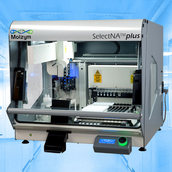Diagnostic Value of 16S/18S Analysis for Culture-Negative Samples |
|
| 05 April 2022 | |
|
In a retrospective study from Marbjerg and colleagues, Micro-Dx™ CE IVD (Molzym, Germany) was evaluated with regard to its clinical value and impact of the results on antimicrobial therapy [1]. Micro-Dx™ CE IVD comprises automated depletion of human DNA and microbial DNA isolation on the SelectNA™plus instrument followed by broad-range 16S and 18S rRNA gene PCR assays for detection of bacteria and fungi and subsequent Sanger sequencing and BLAST analysis to identify the pathogens. The analysis was indicated based on four study criteria: (1) samples from normally sterile sites except venous blood, (2) culture negative specimens, (3) antibiotic administration and (4) unexplained signs of clinical infection [1]. In total 529 samples representing 251 episodes were analysed with 71.5% of the samples coming from the orthopaedic surgery department [1]. Bacteria or fungi were detected in 36.1% of samples and judged as clinically relevant in 31.5% of episodes. Adjustment of antibiotic treatment was initiated in 16.7% of episodes after 16S/18S analysis. In their conclusion, the authors highlighted the high positivity rate and clinical relevance of Micro-Dx™ supporting the use of it in routine for selected samples [1]. The study clearly shows that Micro-Dx™ is a valuable tool for the culture-independent diagnosis of infections. |
|
| Reference | |
| [1] Marbjerg LH, Holzknecht BJ, Dargis R, et al. (2020) Commercial bacterial and fungal broad range PCR (micro-dx™) used on culture-negative specimens from normally sterile sites: Diagnostic value and implications for antimicrobial treatment, Diagnostic Microbiology & Infectious Disease(2020), https://doi.org/10.1016/j.diagmicrobio.2020.115028 | |
| Product Information Technical Information |

